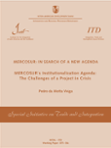MERCOSUR's Institutionalization Agenda: The Challenges of a Project in Crisis
Date
Dec 2003
EDITOR
INTAL
This paper formed part of a Conference "Mercosur: In Search of a New Agenda" held in the Getulio Vargas Foundation in Rio de Janeiro in June 2003. The purpose of the Conference was to was to examine future directions for Mercosur in light of emerging political dynamics pointing to renewed interest in deepening the initiative after a turbulent 1999-2002. The papers and the conference were supported by the Integration and Regional Programs Department of the Inter-American Development Bank through its Special Initiative on Trade and Integration. The Department is grateful for the collaboration of the Foundation and in particular to Professor Renato Flores. This paper is based on the conclusion that MERCOSUR suffers from an "institutional deficit". This deficit is associated to lack of credibility on the project, inefficient rules production system, fragile mechanisms that "oblige" country members to the compliance with agreed rules, and to the impacts, of this group of characteristics, over the "degree of effectiveness" of assumed commitments at the subregional level, and the "level of relevancy" of such commitments for the performance of public and private actors from the member countries. Under this view, to institutionalize does not imply the creation of institutions per se, but rather the strengthening of credibility of a rule production and implementation system at the subregional level: this should be the main objective on the institutionalization agenda of the integration process. A MERCOSUR institutionalization agenda is not only part of a minimalist strategy for the perfecting of the process but also constitutes an "informed" vision of the deep integration process. Above any hypothesis this institutionalization agenda must contemplate three priority areas: (i) rule production system: legislation characteristics, a profile of the decision taking structure and the exchange mechanism between domestic policy formulation and the decision-making processes at the subregional level; (ii) secondly, implementation mechanisms of subregional regulations, that is, "obligation" rules of the member states in relation to the fulfillment of assumed commitments within MERCOSUR and (iii) "the focus" of the rules, i.e. their content.




